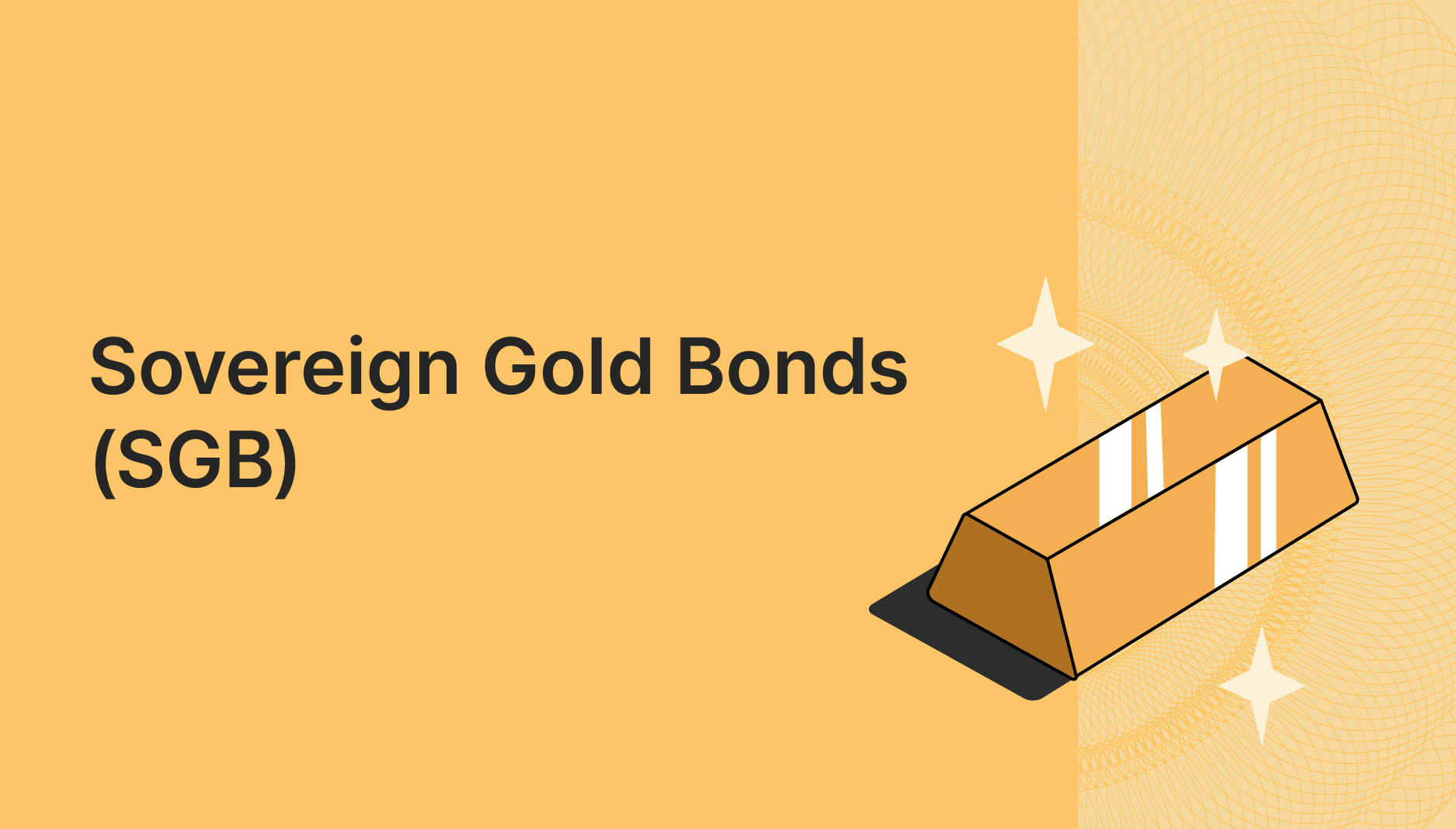All you need to know about Sovereign Gold Bonds

If you think investing in gold is so passé, let us introduce you to Sovereign Gold Bonds (SGBs). They combine the safety of government securities with the returns potential of gold. But you may have a lot of questions about them. In this blog, we answer the following questions:
-
What are SGBs?
-
Where are they invested?
-
Who issues them?
-
Who should invest in them?
-
When are they issued and when do they mature?
-
How to redeem them?
-
Why are they becoming popular?
What is a Sovereign Gold Bond?
A Sovereign Gold Bond is a government security valued in grams of gold. Simply put, it is gold that comes with the government's guarantee. These bonds are an efficient way for individuals to invest in gold without the need to physically own or store the metal.
Who issues it and who shouldinvest in SGB?
Sovereign Gold Bonds are issued by the RBI on behalf of the Government of India. They are suitable for individuals who want to invest in gold and earn returns linked to the price of gold. Investors who prefer the safety of government-backed securities and are willing to hold the investment for the long term may find SGBs appealing.
Where are SGB funds invested?
The funds raised through SGBs are invested in gold. The underlying asset for SGBs is physical gold, which is held by the RBI on behalf of the bondholders.
When are SGBs issued and when do they mature?
Sovereign Gold Bonds are issued periodically by the RBI. The specific dates for each issue are announced by the government. SGBs typically have a tenor of 8 years, but there is an option to exit after 5 years. The maturity period allows investors to stay invested in gold for the long term and also benefit from potential price appreciation.
Interest on Sovereign Gold Bonds
Sovereign Gold Bonds (SGBs) offer attractive returns to investors. The returns on SGBs consist of two components:
1.Interest payout: SGBs provide a fixed annual interest payout of 2.5% of the initial investment, paid twice a year.
2.Appreciation of gold: In addition to the interest payout, SGBs also offer the potential for capital appreciation based on the movement in the price of gold. On average, this appreciation is estimated at 7.0% per annum (based on gold returns in the last 10 years).
Taxes on Sovereign Gold Bonds
When it comes to taxes, SGBs have advantages that make them an attractive investment option:
-
Interest taxation: The interest earned on SGBs is taxable at the individual's slab rate. This means it will be taxed based on the individual's applicable income tax rate.
-
No capital gains tax on maturity: One of the significant benefits of SGBs is that they are exempt from capital gains tax upon maturity. If you hold the bonds until maturity, you won't have to pay any tax on the gains made from selling them.
-
No GST (Goods and Services Tax): SGBs are exempt from GST. This means you won't have to pay any GST on the purchase or sale of these bonds.
-
No STT (Securities Transaction Tax): Another advantage of SGBs is that they are not subject to STT. This tax exemption helps investors save on transaction costs.
How to redeem Sovereign Gold Bonds?
Sovereign Gold Bond redemption is at maturity, which is the end of the 8-year period. The redemption proceeds are based on a simple average of closing price of gold of 999 purity of previous 3 business days from the date of repayment, published by the India Bullion and Jewelers Association Limited. Both interest and redemption proceeds will be credited to the bank account furnished by the investor at the time of buying the bond.
Benefits of Sovereign Gold Bonds
If you are thinking if SGB is a good investment or not, here is a list of its benefits to help you out:
-
Safety: SGBs are issued by the Government of India, making them one of the safest investment options. The government backing provides assurance regarding the security of the investment.
-
No fear of theft: SGBs allow investors to gain exposure to the price movement of gold without the need to physically own or store the metal. This eliminates concerns related to the storage and security of physical gold.
-
Potential for capital appreciation: Like physical gold, the value of Sovereign Gold Bonds is linked to the price of gold. If the price of gold increases over time, the value of SGBs also tends to appreciate, providing potential capital gains.
-
Regular income: In addition to capital appreciation, Sovereign Gold Bonds offer a fixed annual interest rate (currently 2.5% per annum) on the initial investment amount. This interest is credited semi-annually to the investor's bank account.
-
Tax benefits: When you redeem your Sovereign Gold Bonds (SGBs), you won't have to pay any capital gains tax. This means you get to keep all the profits you make when selling your bonds. Additionally, if you hold the bonds for the long term and then decide to transfer them, you may also enjoy indexation benefits. These benefits help adjust the purchase price of the bond for inflation, potentially reducing your taxable gains.
-
No making charges: Unlike physical gold, there are no making charges associated with SGBs. Investors only need to pay the issue price.
-
Diversification: Sovereign Gold Bonds provide an opportunity to diversify an investment portfolio. By adding gold to the portfolio, you can reduce the overall risk and volatility, as gold often behaves differently than other asset classes like stocks or bonds.
Remember, while SGBs offer several advantages, you should carefully consider your investment goals, risk tolerance and financial situation before making any investment decisions.